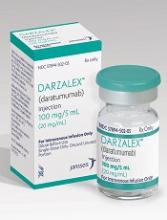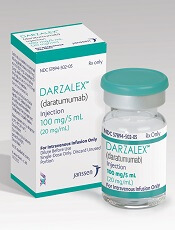User login
The US Food and Drug Administration (FDA) has granted priority review to a supplemental biologics license application (sBLA) for daratumumab (Darzalex®).
This sBLA is for daratumumab (D) to be used in combination with bortezomib, melphalan, and prednisone (VMP) for the treatment of patients with newly diagnosed multiple myeloma (MM) who are ineligible for autologous stem cell transplant.
The FDA expects to make a decision on the sBLA by May 21, 2018.
The agency’s goal is to take action on a priority review application within 6 months of receiving it, rather than the standard 10 months.
The FDA grants priority review to applications for products that may provide significant improvements in the treatment, diagnosis, or prevention of serious conditions.
The priority review for this sBLA is based on data from the phase 3 ALCYONE study, which were presented at the 2017 ASH Annual Meeting and simultaneously published in NEJM.
In this study, researchers compared VMP to D-VMP in 706 patients with newly diagnosed MM who were not eligible for high-dose chemotherapy with autologous stem cell transplant.
D-VMP produced deeper responses than VMP. The overall response rate was 74% in the VMP arm and 91% in the D-VMP arm (P<0.0001). The rate of complete response was 24% and 43%, respectively (P<0.0001).
D-VMP also prolonged progression-free survival (PFS) compared to VMP.
The median PFS was 18.1 months in the VMP arm and was not reached in the D-VMP arm. The 12-month PFS was 76% and 87%, respectively. And the 18-month PFS was 50% and 72%, respectively.
The median overall survival was not reached in either treatment arm.
The most common grade 3/4 treatment-emergent adverse events (in the D-VMP and VMP arms, respectively) were neutropenia (40% and 39%), thrombocytopenia (34% and 38%), and anemia (16% and 20%).
The rate of grade 3/4 infections was higher in the D-VMP arm than the VMP arm—23% and 15%, respectively. The most common of these was pneumonia, with rates of 11% and 4%, respectively.
There were 6 deaths due to treatment-emergent adverse events in the D-VMP arm and 5 in the VMP arm.
About daratumumab
Daratumumab is a CD38-directed cytolytic antibody that is FDA approved for the following indications:
- In combination with lenalidomide and dexamethasone, or bortezomib and dexamethasone, for the treatment of MM patients who have received at least 1 prior therapy
- In combination with pomalidomide and dexamethasone for the treatment of MM patients who have received at least 2 prior therapies, including lenalidomide and a proteasome inhibitor (PI)
- As monotherapy for MM patients who have received at least 3 prior lines of therapy, including a PI and an immunomodulatory agent, or who are double-refractory to a PI and an immunomodulatory agent.

The US Food and Drug Administration (FDA) has granted priority review to a supplemental biologics license application (sBLA) for daratumumab (Darzalex®).
This sBLA is for daratumumab (D) to be used in combination with bortezomib, melphalan, and prednisone (VMP) for the treatment of patients with newly diagnosed multiple myeloma (MM) who are ineligible for autologous stem cell transplant.
The FDA expects to make a decision on the sBLA by May 21, 2018.
The agency’s goal is to take action on a priority review application within 6 months of receiving it, rather than the standard 10 months.
The FDA grants priority review to applications for products that may provide significant improvements in the treatment, diagnosis, or prevention of serious conditions.
The priority review for this sBLA is based on data from the phase 3 ALCYONE study, which were presented at the 2017 ASH Annual Meeting and simultaneously published in NEJM.
In this study, researchers compared VMP to D-VMP in 706 patients with newly diagnosed MM who were not eligible for high-dose chemotherapy with autologous stem cell transplant.
D-VMP produced deeper responses than VMP. The overall response rate was 74% in the VMP arm and 91% in the D-VMP arm (P<0.0001). The rate of complete response was 24% and 43%, respectively (P<0.0001).
D-VMP also prolonged progression-free survival (PFS) compared to VMP.
The median PFS was 18.1 months in the VMP arm and was not reached in the D-VMP arm. The 12-month PFS was 76% and 87%, respectively. And the 18-month PFS was 50% and 72%, respectively.
The median overall survival was not reached in either treatment arm.
The most common grade 3/4 treatment-emergent adverse events (in the D-VMP and VMP arms, respectively) were neutropenia (40% and 39%), thrombocytopenia (34% and 38%), and anemia (16% and 20%).
The rate of grade 3/4 infections was higher in the D-VMP arm than the VMP arm—23% and 15%, respectively. The most common of these was pneumonia, with rates of 11% and 4%, respectively.
There were 6 deaths due to treatment-emergent adverse events in the D-VMP arm and 5 in the VMP arm.
About daratumumab
Daratumumab is a CD38-directed cytolytic antibody that is FDA approved for the following indications:
- In combination with lenalidomide and dexamethasone, or bortezomib and dexamethasone, for the treatment of MM patients who have received at least 1 prior therapy
- In combination with pomalidomide and dexamethasone for the treatment of MM patients who have received at least 2 prior therapies, including lenalidomide and a proteasome inhibitor (PI)
- As monotherapy for MM patients who have received at least 3 prior lines of therapy, including a PI and an immunomodulatory agent, or who are double-refractory to a PI and an immunomodulatory agent.

The US Food and Drug Administration (FDA) has granted priority review to a supplemental biologics license application (sBLA) for daratumumab (Darzalex®).
This sBLA is for daratumumab (D) to be used in combination with bortezomib, melphalan, and prednisone (VMP) for the treatment of patients with newly diagnosed multiple myeloma (MM) who are ineligible for autologous stem cell transplant.
The FDA expects to make a decision on the sBLA by May 21, 2018.
The agency’s goal is to take action on a priority review application within 6 months of receiving it, rather than the standard 10 months.
The FDA grants priority review to applications for products that may provide significant improvements in the treatment, diagnosis, or prevention of serious conditions.
The priority review for this sBLA is based on data from the phase 3 ALCYONE study, which were presented at the 2017 ASH Annual Meeting and simultaneously published in NEJM.
In this study, researchers compared VMP to D-VMP in 706 patients with newly diagnosed MM who were not eligible for high-dose chemotherapy with autologous stem cell transplant.
D-VMP produced deeper responses than VMP. The overall response rate was 74% in the VMP arm and 91% in the D-VMP arm (P<0.0001). The rate of complete response was 24% and 43%, respectively (P<0.0001).
D-VMP also prolonged progression-free survival (PFS) compared to VMP.
The median PFS was 18.1 months in the VMP arm and was not reached in the D-VMP arm. The 12-month PFS was 76% and 87%, respectively. And the 18-month PFS was 50% and 72%, respectively.
The median overall survival was not reached in either treatment arm.
The most common grade 3/4 treatment-emergent adverse events (in the D-VMP and VMP arms, respectively) were neutropenia (40% and 39%), thrombocytopenia (34% and 38%), and anemia (16% and 20%).
The rate of grade 3/4 infections was higher in the D-VMP arm than the VMP arm—23% and 15%, respectively. The most common of these was pneumonia, with rates of 11% and 4%, respectively.
There were 6 deaths due to treatment-emergent adverse events in the D-VMP arm and 5 in the VMP arm.
About daratumumab
Daratumumab is a CD38-directed cytolytic antibody that is FDA approved for the following indications:
- In combination with lenalidomide and dexamethasone, or bortezomib and dexamethasone, for the treatment of MM patients who have received at least 1 prior therapy
- In combination with pomalidomide and dexamethasone for the treatment of MM patients who have received at least 2 prior therapies, including lenalidomide and a proteasome inhibitor (PI)
- As monotherapy for MM patients who have received at least 3 prior lines of therapy, including a PI and an immunomodulatory agent, or who are double-refractory to a PI and an immunomodulatory agent.


